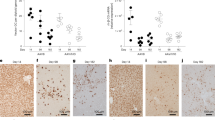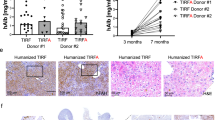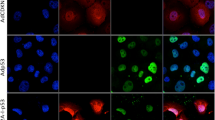Abstract
Gene therapy is an attractive therapy for hepatocarcinoma, and several approaches have been studied using murine leukemia virus-derived retroviruses. We compared gene transfer efficacy and transgene expression kinetics after transduction of hepatocarcinoma cell lines using enhanced green fluorescent protein (EGFP)-expressing murine leukemia virus-derived retroviral vectors and HIV-derived lentiviral vectors. First, we showed that both retroviral and lentiviral vectors efficiently transduce cycling hepatocarcinoma cell lines in vitro. However, after cell cycle arrest, transduction efficacy remained the same for lentiviral vectors but it decreased by 80% for retroviral vectors. Second, we studied EGFP expression kinetics using lentiviral vectors expressing EGFP under the control of cytomegalovirus (CMV) or phosphoglycerolkinase (PGK) promoter. We show that the CMV promoter allows a stronger EGFP expression than the PGK promoter. However, in contrast to PGK-driven EGFP expression, which persists up to 2 months after transduction, CMV-driven EGFP expression rapidly decreased with time. This phenomenon is due to promoter silencing, and EGFP expression can be restored in transduced cells by using transcription activators such as interleukin-6 or phorbol myristate acetate/ionomycin and, to a lesser extent, the demethylating agent 5′-azacytidine. Altogether, our results suggest that lentiviral vectors, which allow efficient transduction of hepatocarcinoma cell lines with a strong and a sustained expression according to the promoter used, are promising tools for gene therapy of hepatocarcinomas.
This is a preview of subscription content, access via your institution
Access options
Subscribe to this journal
Receive 12 print issues and online access
$259.00 per year
only $21.58 per issue
Buy this article
- Purchase on Springer Link
- Instant access to full article PDF
Prices may be subject to local taxes which are calculated during checkout
Similar content being viewed by others
Author information
Authors and Affiliations
Corresponding author
Rights and permissions
About this article
Cite this article
Gerolami, R., Uch, R., Jordier, F. et al. Gene transfer to hepatocellular carcinoma: Transduction efficacy and transgene expression kinetics by using retroviral and lentiviral vectors. Cancer Gene Ther 7, 1286–1292 (2000). https://doi.org/10.1038/sj.cgt.7700225
Received:
Accepted:
Published:
Issue Date:
DOI: https://doi.org/10.1038/sj.cgt.7700225
Keywords
This article is cited by
-
Safe and Efficient Gene Therapy for Pyruvate Kinase Deficiency
Molecular Therapy (2016)
-
Gene therapy to treat cardiac arrhythmias
Nature Reviews Cardiology (2015)
-
An Efficient and Safe Herpes Simplex Virus Type 1 Amplicon Vector for Transcriptionally Targeted Therapy of Human Hepatocellular Carcinomas
Molecular Therapy (2007)
-
CMV enhancer/human PDGF-β promoter for neuron-specific transgene expression
Gene Therapy (2004)
-
Transduction of human glial and neuronal tumor cells with different lentivirus vector pseudotypes
Journal of Neuro-Oncology (2004)



